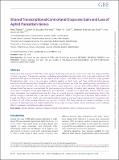Shared transcriptional control and disparate gain and loss of aphid parasitism genes
Abstract
Aphids are a diverse group of taxa that contain agronomically important species, which vary in their host range and ability to infest crop plants. The genome evolution underlying agriculturally important aphid traits is not well understood. We generated draft genome assemblies for two aphid species: Myzus cerasi (black cherry aphid), and the cereal specialist Rhopalosiphum padi. Using a de novo gene prediction pipeline on both these, and three additional aphid genome assemblies (Acyrthosiphon pisum, D. noxia and M. persicae), we show that aphid genomes consistently encode similar gene numbers. We compare gene content, gene duplication, synteny, and putative effector repertoires between these five species to understand the genome evolution of globally important plant parasites. Aphid genomes show signs of relatively distant gene duplication, and substantial, relatively recent, gene birth. Putative effector repertoires, originating from duplicated and other loci have an unusual genomic organisation and evolutionary history. We identify a highly conserved effector-pair that is tightly physically-linked in the genomes of all aphid species tested. In R. padi, this effector pair is tightly transcriptionally-linked, and shares an unknown transcriptional control mechanism with a subset of approximately 50 other putative effectors and secretory proteins. This study extends our current knowledge on the evolution of aphid genomes and reveals evidence for an as of yet unknown shared control mechanism, which underlies effector expression, and ultimately plant parasitism.
Citation
Thorpe , P , Escudero-Martinez , C M , Cock , P J A , Eves-van den Akker , S & Bos , J I B 2018 , ' Shared transcriptional control and disparate gain and loss of aphid parasitism genes ' , Genome Biology and Evolution , vol. 10 , no. 10 , pp. 2716-2733 . https://doi.org/10.1093/gbe/evy183
Publication
Genome Biology and Evolution
Status
Peer reviewed
ISSN
1759-6653Type
Journal article
Description
This work was supported by the Biotechnology and Biological Sciences Research Council (BB/M014207/1 to SEvdA), European Research Council (310190- APHIDHOST to JIBB), and Royal Society of Edinburgh (fellowship to JIBB).Collections
Items in the St Andrews Research Repository are protected by copyright, with all rights reserved, unless otherwise indicated.

